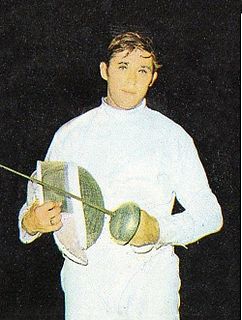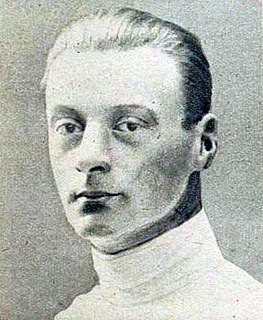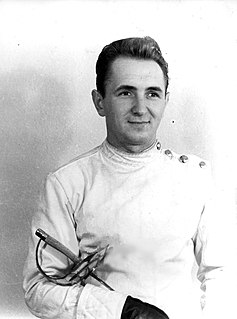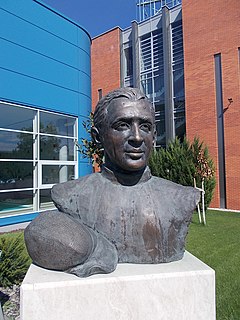
The men's sabre was one of four fencing events on the Fencing at the 1908 Summer Olympics programme. The top two places were won by Hungarian fencers, who also took the gold medal in the team sabre event. Jenő Fuchs took the gold medal and Béla Zulawszky the silver. Bronze went to Bohemian Vilém Goppold von Lobsdorf. There were 76 competitors from 11 nations. Each nation could enter up to 12 fencers.

The men's épée was one of eight fencing events on the fencing at the 1964 Summer Olympics programme. It was the fourteenth appearance of the event. The competition was held from October 18 to 19 1964. 65 fencers from 25 nations competed. Each nation was limited to three fencers. The event was won by Grigory Kriss of the Soviet Union, the nation's first gold medal in the event after a bronze four years earlier. The Soviets also took bronze, with Guram Kostava finishing in third place. Between the two was silver medalist Bill Hoskyns of Great Britain; it was the second consecutive Games with a British silver medalist in the event. Italy's six-Games gold medal streak in the men's individual épée ended with the nation missing the podium entirely; Gianluigi Saccaro finished fourth after losing the bronze-medal barrage to Kostava.

The men's sabre was one of eight fencing events on the fencing at the 1964 Summer Olympics programme. It was the fifteenth appearance of the event. The competition was held from October 19 to 20, 1964. 52 fencers from 21 nations competed. Nations had been limited to three fencers each since 1928. The event was won by Tibor Pézsa, the final of nine straight Games in which a Hungarian fencer won the event. The silver medal went to Claude Arabo of France, with Umyar Mavlikhanov of the Soviet Union taking bronze.

The men's sabre was a fencing event held as part of the Fencing at the 1912 Summer Olympics programme. It was the fifth appearance of the event.

The men's sabre was one of seven fencing events on the Fencing at the 1924 Summer Olympics programme. It was the seventh appearance of the event, the only fencing event to have been on the programme at every Games. The competition was held from Tuesday July 16, 1924 to Thursday July 18, 1924. 47 fencers from 15 nations competed. Nations were limited to four fencers each, down from eight in 1920. The event was won by Sándor Pósta of Hungary, beginning a nine-Games streak in which Hungarians won the gold medal in the men's sabre. Roger Ducret of France took silver, while another Hungarian—János Garay—earned bronze.

The men's foil was one of seven fencing events on the Fencing at the 1928 Summer Olympics programme. It was the seventh appearance of the event. The competition was held from 31 July 1928 to 1 August 1928. 54 fencers from 22 nations competed. For the third straight Games, the limit of fencers per nation was reduced. The event was won by Lucien Gaudin of France, the nation's second consecutive and fourth overall victory in the men's foil. Erwin Casmir earned silver to give Germany its first medal in the event. Giulio Gaudini of Italy took bronze.

The men's sabre was one of seven fencing events on the Fencing at the 1928 Summer Olympics programme. It was the eighth appearance of the event. The competition was held from 10 August 1928 to 11 August 1928. 44 fencers from 17 nations competed. For the third straight Games, the limit of fencers per nation was reduced. The event was won by Ödön von Tersztyánszky of Hungary, the second in a nine-Games streak of Hungarian wins. Attila Petschauer, also of Hungary, took silver. Italy's Bino Bini earned bronze.

The men's sabre was one of seven fencing events on the fencing at the 1932 Summer Olympics programme. It was the ninth appearance of the event. The competition was held from 12 August 1932 to 13 August 1932. 25 fencers from 12 nations competed. Five additional fencers entered but did not start. Each nation was limited to three fencers. The event was won by György Piller of Hungary, the third of nine straight Games in which a Hungarian would win the event. Giulio Gaudini of Italy took silver, while another Hungarian earned bronze.

The men's sabre was one of seven fencing events on the fencing at the 1936 Summer Olympics programme. It was the tenth appearance of the event. The competition was held from 14 August 1936 to 15 August 1936. 71 fencers from 26 nations competed. Nations were limited to three fencers each. The event was won by Endre Kabos of Hungary, the fourth of nine straight Games in which a Hungarian would win the event. Kabos became the second man to win multiple medals in the individual sabre, adding to his 1932 bronze. Gustavo Marzi of Italy took silver, while Hungarian Aladár Gerevich earned bronze.

The men's sabre was one of seven fencing events on the fencing at the 1948 Summer Olympics programme. It was the eleventh appearance of the event. The competition was held from 12 August 1948 to 13 August 1948. 60 fencers from 24 nations competed. Nations were limited to three fencers each. The event was won by Aladár Gerevich, the fifth of nine straight Games in which a Hungarian would win the event. Gerevich became the third man to win multiple medals in the individual sabre, adding to his 1936 bronze. Vincenzo Pinton of Italy took silver and Pál Kovács of Hungary took bronze; it was the third straight Games where the sabre podium was Hungary-Italy-Hungary.

The men's épée was one of seven fencing events on the fencing at the 1952 Summer Olympics programme. It was the eleventh appearance of the event. The competition was held from 27 July 1952 to 28 July 1952. 76 fencers from 29 nations competed. Nations were limited to three fencers each. The event was won by Edoardo Mangiarotti of Italy, the nation's fourth consecutive victory in the men's épée. It was also the fourth consecutive year that Italy had at least two fencers on the podium in the event, as Edoardo's brother Dario Mangiarotti took silver. Bronze went to Oswald Zappelli of Switzerland. Zappelli and Edoardo Mangiarotti had faced each other in a barrage for silver and bronze medals in 1948, which Zappelli had won; the two men were the fifth and sixth to earn multiple medals in the event.

The men's foil was one of seven fencing events on the fencing at the 1952 Summer Olympics programme. It was the eleventh appearance of the event. The competition was held from 23 July 1952 to 24 July 1952. 61 fencers from 25 nations competed. All three medallists were left-handed. Nations were limited to three fencers each since 1928. The event was won by Christian d'Oriola of France, the nation's second consecutive victory in the men's foil and sixth overall. D'Oriola was the fifth man to win multiple medals in the event. The silver and bronze medals were won by Edoardo Mangiarotti and Manlio Di Rosa of Italy.

The men's sabre was one of seven fencing events on the fencing at the 1952 Summer Olympics programme. It was the twelfth appearance of the event. The competition was held from 31 July 1952 to 1 August 1952. 66 fencers from 26 nations competed. Nations were limited to three fencers each. The event was won by Pál Kovács, the sixth of nine straight Games in which a Hungarian would win the event. Kovács became the fourth man to win multiple medals in the individual sabre, adding to his 1948 bronze. Hungary swept the medals in the event for the second time. Aladár Gerevich's silver completed a set of three different color medals in the event, the first man to win three medals in individual sabre. Tibor Berczelly earned bronze.

The men's épée was one of seven fencing events on the fencing at the 1956 Summer Olympics programme. It was the twelfth appearance of the event. The competition was held on 30 November 1956. 41 fencers from 18 nations competed. Nations were limited to three fencers each. The event was won by Carlo Pavesi of Italy, the nation's fifth consecutive victory in the men's épée. In all five of those Games, Italy earned at least two medals in the event; this was the second sweep during that period for Italy. Giuseppe Delfino was the silver medalist while Edoardo Mangiarotti took bronze. It was Mangiarotti's third medal in the event, along with gold in 1952 and another bronze in 1948; he was the first man to win three medals in the individual épée.

The men's sabre was one of eight fencing events on the fencing at the 1960 Summer Olympics programme. It was the fourteenth appearance of the event. The competition was held from 7 to 8 September 1960. 70 fencers from 29 nations competed. Nations had been limited to three fencers each since 1928. The event was won by Rudolf Kárpáti, the eighth of nine straight Games in which a Hungarian would win the event. Kárpáti was the second man to successfully defend an Olympic title in the men's sabre and fifth to win multiple medals of any color. His teammate Zoltán Horváth took silver while Wladimiro Calarese of Italy finished with the bronze.

The men's sabre was one of eight fencing events on the fencing at the 1968 Summer Olympics programme. It was the sixteenth appearance of the event. The competition was held from 16 to 17 October 1968. 40 fencers from 16 nations competed. Nations had been limited to three fencers each since 1928. The event was won by Jerzy Pawłowski of Poland, breaking a nine-Games string of Hungarian victories in the event. Hungary's best result in the event was Tibor Pézsa's bronze; Pézsa beat Pawłowski in the final pool but the Hungarian lost two other bouts while the Pole was otherwise flawless. Mark Rakita of the Soviet Union lost only to Pawłowski in the final pool, forcing another bout to break the tie between them for gold and silver; that barrage bout was decided by a single point as Pawłowski beat Rakita 5–4.

The men's épée was one of eight fencing events on the fencing at the 1972 Summer Olympics programme. It was the sixteenth appearance of the event. The competition was held from 4 to 6 September 1972. 71 fencers from 28 nations competed. Each nation was limited to three fencers. The event was won by Csaba Fenyvesi of Hungary, the nation's second consecutive victory in the event. His countryman Győző Kulcsár, the 1968 gold medalist, earned bronze this time to become the ninth man to win multiple medals in the men's individual épée. Silver went to Jacques Ladègaillerie of France; the French épéeists, a power in the event from 1900 to 1932, earned their first individual medal in 40 years. The three-Games podium streak of the Soviet Union was snapped, with all three Soviet fencers reaching the semifinals but eliminated there.

The men's sabre was one of eight fencing events on the fencing at the 1972 Summer Olympics programme. It was the seventeenth appearance of the event. The competition was held from 30 to 31 August 1972. 53 fencers from 22 nations competed. Nations had been limited to three fencers each since 1928. The event was won by Viktor Sidyak of the Soviet Union, the nation's first victory in the event. Hungary had lost its nine-Games gold medal streak in 1968 but remained a power in the event; Péter Marót took silver to extend Hungary's podium streak to 11 Games. Another Soviet, Vladimir Nazlymov, earned bronze.

The men's sabre was one of eight fencing events on the fencing at the 1980 Summer Olympics programme. It was the nineteenth appearance of the event. The competition was held from 24 to 25 July 1980. 30 fencers from 12 nations competed. Nations had been limited to three fencers each since 1928. The event was won by defending champion Viktor Krovopuskov of the Soviet Union, the nation's third consecutive victory in the event. Krovopuskov was the third man to successfully defend a sabre title and the 10th man to win two medals of any color in the event. His teammate Mikhail Burtsev took silver. Imre Gedővári's bronze medal returned Hungary to the podium after a one-Games absence broke an eleven-Games streak.

The men's sabre was one of eight fencing events on the fencing at the 1992 Summer Olympics programme. It was the twenty-second appearance of the event. The competition was held on 2 August 1992. 44 fencers from 19 nations competed. Nations had been limited to three fencers each since 1928. The event was won by Bence Szabó of Hungary, the nation's first victory in the men's sabre since 1964 and 12th overall. Marco Marin took silver while Jean-François Lamour finished with the bronze. Lamour, who had won gold in 1984 and 1988, was unable to win a third title but still became only the second man with three medals in the event. Marin had also finished second in 1984; he was the 12th man with multiple medals in the sabre.




















